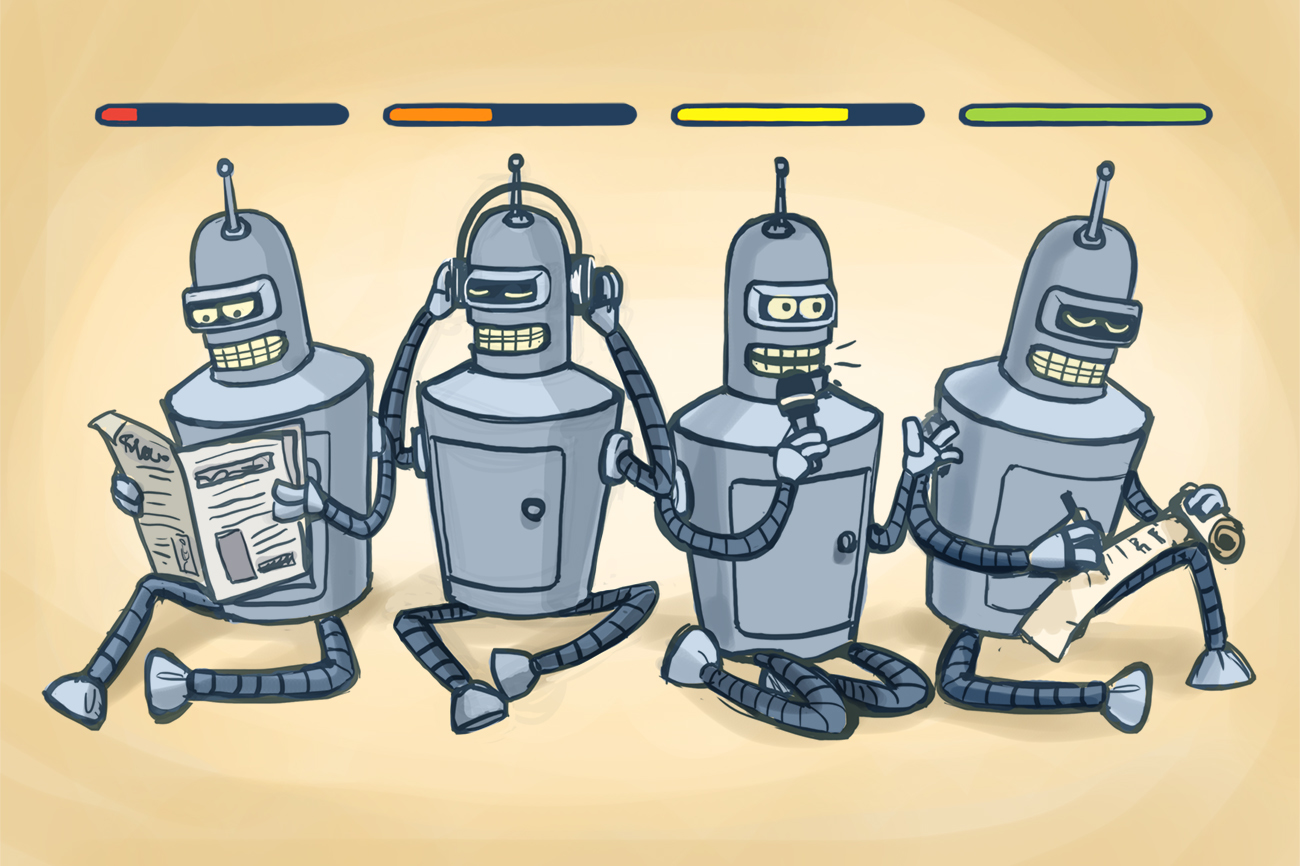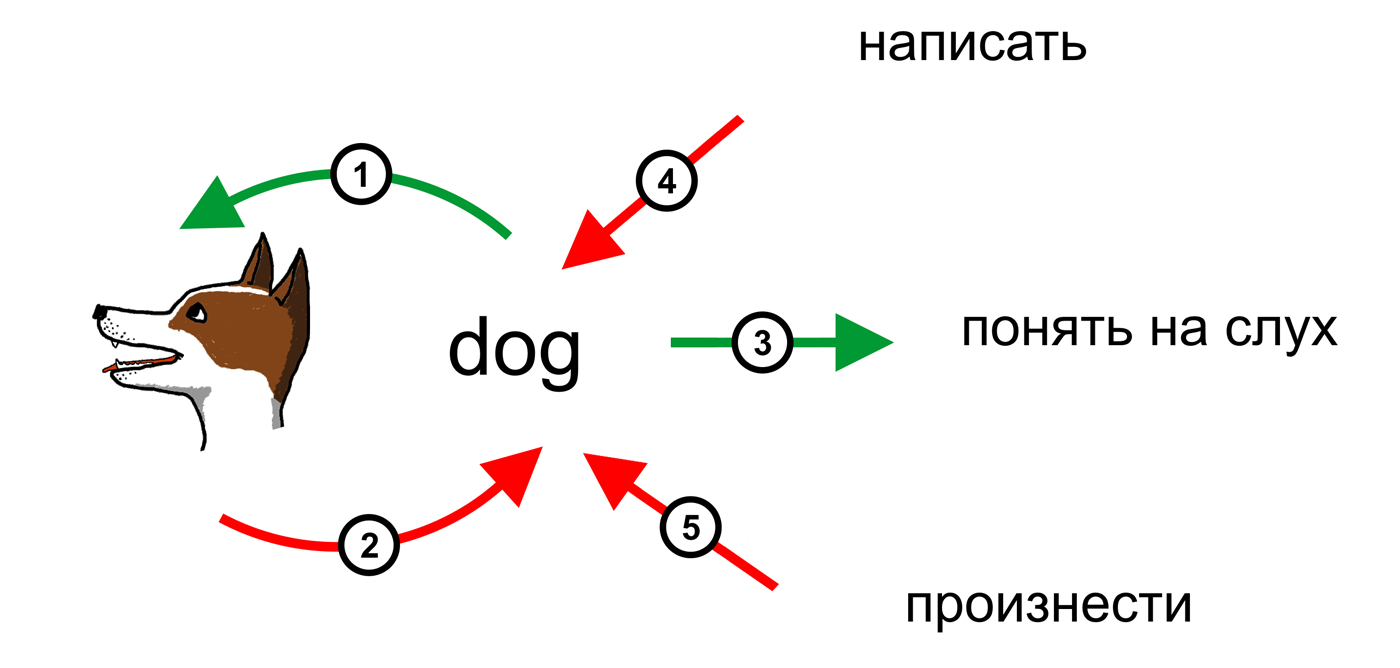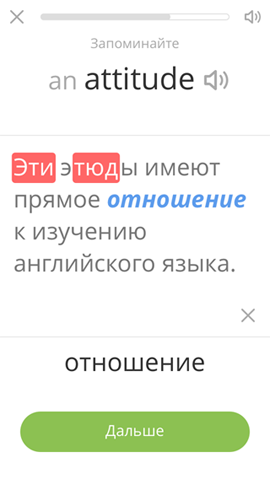I see everything, hear everything, and write, and I say: mechanics for training lexical skills in the Aword application

For effective memorization of words, it is not enough just Ebingaus algorithms . It is necessary that the short-term memory works correctly: simple cramming quickly “turns off” the brain and does not bring results even at short distances. It is necessary to diversify the memorization exercises as much as possible, try to link not just the Russian and English word, but bind the English word to the concept, finally, it is necessary to develop precisely the skills that the student needs. Today we will talk about the mechanics embedded in our mobile application Aword.
Skills
Two types of skills are applied to the vocabulary: passive and active. We can understand a word by reading or hearing it (passive skills) or, knowing the word, write or pronounce it (active skills). Far from always knowing the word automatically means that we can apply any of these skills to it: most will easily understand the word accuracy by reading it; far fewer people are able to write or pronounce it. And it's far from a fact that all these skills are necessary for all our students: someone is going to use only the written language, someone does not need active skills at all, it is enough to read and listen; and someone needs only the ability to read articles in their professional field.
We don’t strive to instil in our students skills that they don’t need. Therefore, we have identified five skills and give the student the opportunity to choose what he wants to learn:
')

1. Basic knowledge of a word (ability to match a read English word and concept, mandatory passive skill)
2. The use of the word in the active dictionary (the ability to recall the English notation of the concept)
3. The perception of the word by ear (passive skill)
4. Spelling (active skill)
5. Pronunciation (active skill)
The question may arise: what is the difference between the first two skills, if we are talking about the concept and the corresponding English word? The fact is that learners (and even those who know) a foreign language have passive skills that are always stronger than active ones, and passive vocabulary is more active. A simple example: remember the English translation of the word "beautiful." Most likely, you got a school beautiful, well, or pretty, if you thought about the girl. Meanwhile, there is still nice, fine, good-looking, handsome, bonny and even sometimes fair. You know all these words and, having met in the English text, you will not stumble; however, if you need to formulate the concept of “beautiful” in English, you will most likely dwell on the first two. And yes, we understand that this is a rough example, and many of these synonyms have a more accurate translation than “beautiful”, but we chose it for clarity. An active basic skill is needed in order to be able, on a subconscious level, to select the English word that most closely matches the context.
In our mobile application, all the words studied are objects that possess, in particular, five meanings of knowledge of the skills listed above (including students who have not chosen all five — they can then change their mind). The value of knowledge - a number from zero to one; it grows as you workout and decreases if the student misses classes. When this value reaches unity, the word is considered to be studied (entered into short-term memory). To determine what kind of skill rose as a result of the next repetition, allows knowledge of what mechanics was used in the next exercise, and what is its weight for each skill.

Mechanics
Mechanics are, relatively speaking, the building blocks of which our training is built. Each exercise uses the same mechanics. A rough example: if you are asked to type in English the word “beautiful”, you will learn to spell it. If asked to say into the microphone - pronunciation. But, of course, not everything is so simple: for example, it is obvious that in both these cases you also train the second skill (active proficiency in vocabulary). The absolute majority of mechanics promote more than one skill.
We spent six months on the selection and testing of a mechanic, and it was quite fun. First, we collected a huge pile of everything that we were able to recall, found in manuals and well-known algorithms (for example, Anki), as well as come up during the period of illumination. The pile was thinned out by removing the repetitions, after which our methodologists placed all the remaining mechanics of the weight skills. These were numbers from 0 to 1, showing the usefulness of mechanics for training one or another skill.
The presence of weights allowed to further thin out the list on the principle of "utility." First of all, the mechanics were removed, losing to their fellows by the ability to train the "profile" skill. Then, mechanics that had too low a general “utility” coefficient — the sum of the weights — were removed, since, as mentioned above, mechanics usually train more than one skill (but in different proportions). As a result, we have about 30 types of exercises left, which we began to test.
The first testing went "on the knee". Tests could be in the form of just an oral quiz, and in the form of written exercises, and in the form of small applications with a wired list of words that our employees and friends took. These preliminary tests allowed to continue thinning the list based on the results and impressions of the participants in the experiments. Our task was to get in the end a list of the minimum number of five skill exercises that are absolutely necessary for a full-fledged workout.
And here it is necessary to make a small digression:

Missing pronunciation
The current version of Aword has no pronunciation workouts. The fact is that this is a very complicated thing that requires development that is completely unrelated to the rest of the mobile application. At the same time, in our database of tens of thousands of clients, we know that the skill of pronunciation is far from being demanded by all students.
Those of our students who need to train him usually work with native speakers and visit our free online talkers. We have everything you need to train all other skills, including a detailed dictionary with pictures and voice acting, but the pronunciation has not yet been algorithmized. We realized that if we want to release a mobile application on time, this skill will have to be abandoned for now.
This, however, does not mean that it will not. On the contrary, now the best forces are thrown at him, and this is our most interesting product at work (not counting Grammar). For example, all employees are engaged in speaking words into a microphone, and those who are fluent in the language make special mistakes to teach the algorithms to recognize them. We found very interesting developers dealing with speech recognition, in particular, for international call centers, and we actively cooperate with them.
And, of course, the pronunciation will be. And we will write about him separately, but for now let's finish a small digression.

Testing
So, we collected about two dozen mechanics (as a result, they are in Appendix 16) to carefully test their usefulness. The Aword web engine was written, in which we invited more than two hundred volunteers who honestly learned the words according to their needs. We wanted to make sure that everything was done correctly, and also to see how accurately we guessed with the weights of skills in different mechanics.
The overall result is that memorizing a word (entering it into short-term memory) requires about 13-15 repetitions. We also made sure that the number of repetitions is not as important as following the Ebingaus memorization program: those volunteers who spent hours in our application did not overtake those that were included in the reminder notes.
More interesting is another thing: we found out that by adding to the students listening exercises (even if they did not choose this skill), we shorten the term of learning words to an average of 11 repetitions! For us, this was not the most obvious discovery, so we experimented for a long time, but the fact remained. If you force a student to recognize a word by ear, he teaches him faster! Therefore, you should not be surprised if these mechanics will be found in your mobile application.
The presence of a variety of mechanics and training of various skills do not allow the brain to shut down due to routine tasks. That, in turn, allows to reduce the time of training and the number of repetitions to effectively memorize a word. Well, it is also just so interesting - the student does not get bored.
All this can be tried by downloading the Aword application in the App Store . Soon it will be available on Google Play, and in November - in the Web version!
Well, if you want to develop such things with us - do not forget to look at our vacancies !
Source: https://habr.com/ru/post/313014/
All Articles